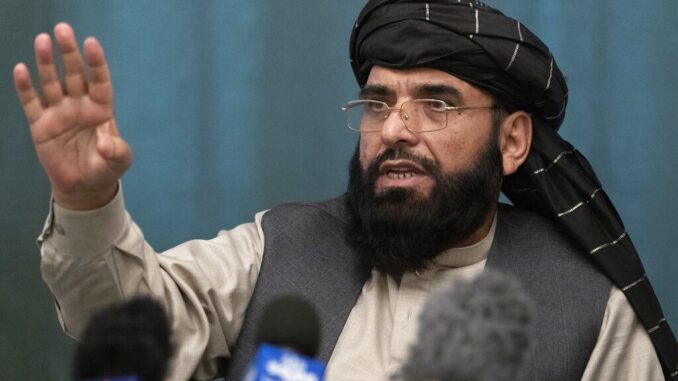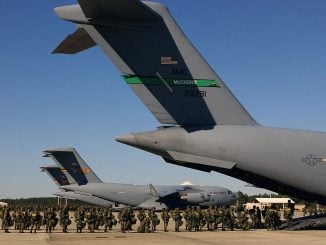
ISLAMABAD — The Taliban say they don’t want to monopolize power, but they insist there won’t be peace in Afghanistan until there is a new negotiated government in Kabul and President Ashraf Ghani is removed.
In an interview with The Associated Press, Taliban spokesman, Suhail Shaheen, who is also a member of the group’s negotiating team, laid out the insurgents’ stance on what should come next in a country on the precipice.
The Taliban have swiftly captured territory in recent weeks, seized strategic border crossings and are threatening a number of provincial capitals — advances that come as the last U.S. and NATO soldiers leave Afghanistan.
The top U.S. military officer, Gen. Mark Milley, told a Pentagon press conference that the Taliban have “strategic momentum,” and he did not rule out a complete Taliban takeover. But he said it is not inevitable. “I don’t think the end game is yet written,” he said.
Memories of the Taliban’s last time in power some 20 years ago, when they enforced a harsh brand of Islam that denied girls an education and barred women from work, have stoked fears of their return among many. Afghans who can afford it are applying by the thousands for visas to leave Afghanistan, fearing a violent descent into chaos. The U.S.-NATO withdrawal is more than 95% complete and due to be finished by Aug. 31.
Shaheen said the Taliban will lay down their weapons when a negotiated government acceptable to all sides in the conflict is installed in Kabul and Ghani’s government is gone.
“I want to make it clear that we do not believe in the monopoly of power because any governments who (sought) to monopolize power in Afghanistan in the past, were not successful governments,” said Shaheen, apparently including the Taliban’s own five-year rule in that assessment. “So we do not want to repeat that same formula.”
But he was also uncompromising on the continued rule of Ghani, calling him a war monger and accusing him of using his Tuesday speech on the Islamic holy day of Eid-al-Adha to promise an offensive against the Taliban.
Shaheen dismissed Ghani’s right to govern, resurrecting allegations of widespread fraud that surrounded Ghani’s 2019 election win. After that vote, both Ghani and his rival Abdullah Abdullah declared themselves president. After a compromise deal, Abdullah is now No. 2 in the government and heads the reconciliation council.
Asked about the Taliban demand that Ghani be removed as a condition of a peace agreement, White House press secretary Jen Psaki affirmed President Joe Biden’s support for the Afghan president.
“The President and the administration supports the leadership of the Afghan people, including Ashraf Ghani,” Psaki said.
In a phone call, Biden told Ghani that he’s included $3.3 billion for Afghan security forces in his fiscal year 2022 budget request, according to the White House.
The military aid includes $1 billion to support the Afghan Air Force and Special Mission Wing, $1 billion for fuel, ammunition and spare parts, and $700 million to pay salaries for Afghan soldiers.
The White House said in a statement that the two leaders agreed that the Taliban’s military offensive “is in direct contradiction to the movement’s claim to support a negotiated settlement of the conflict.”
Shaheen said there are no plans to make a military push on Kabul and that the Taliban have so far “restrained” themselves from taking provincial capitals. But he warned they could, given the weapons and equipment they have acquired in newly captured districts. He contended that the majority of the Taliban’s battlefield successes came through negotiations, not fighting.
“Those districts which have fallen to us and the military forces who have joined us … were through mediation of the people, through talks,” he said. “They (did not fall) through fighting … it would have been very hard for us to take 194 districts in just eight weeks.”
The Taliban control about half of Afghanistan’s 419 district centers, and while they have yet to capture any of the 34 provincial capitals, they are pressuring about half of them, Milley said. In recent days, the U.S. has carried out airstrikes in support of beleaguered Afghan government troops in the southern city of Kandahar, around which the Taliban have been amassing, Pentagon press secretary John Kirby said Thursday.
“You know, no one no one wants a civil war, including me,” said Shaheen.
Shaheen also repeated Taliban promises aimed at reassuring Afghans who fear the group.
Washington has promised to relocate thousands of U.S. military interpreters. Shaheen said they had nothing to fear from the Taliban and denied threatening them. But, he added, if some want to take asylum in the West because Afghanistan’s economy is so poor, “that is up to them.”



